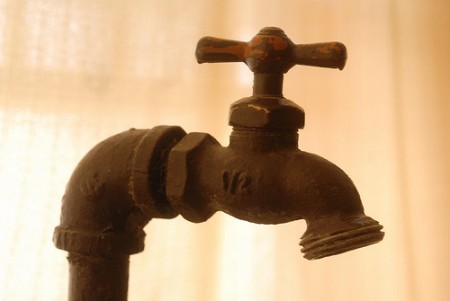
On 28 November 2011, the NCCR North-South Centre for Development and Environment (CDE) based in Bern and the ETH North-South Center based in Zurich sponsored a half-day conference, “Water diplomacy: transboundary rivers and international politics” at the Museum of Natural History in Basel. It explored the theme of water as an instrument of diplomacy, in particular how water management can be used to solve diplomatic conflict and how diplomacy can solve water conflicts and improve resource management. The conference included 5 key presentations from experts with differing perspectives of how water issues can (and do) shape diplomacy, which was followed by a panel discussion with the presenters.
Peter Bosshard, the Policy Director of International Rivers, began with a discussion of the dominant issues regarding water use, availability, quality, and demand. He offered his perspective on whether water can be a vehicle for diplomacy, but noted that many issues still need to be resolved, especially in the areas of international law, water rights and water sector resilience.
The issue of water development policy in the Central Asia among the former Soviet republics was discussed by Tobias Siegfried. He provided an overview of water systems and glacial melting in the region and outlined the history of water management under the Soviet regime, and noted how in the post-Soviet context the historical water management system also collapsed, resulting in a greater number of regional disputes and tension around the issue of water flows.
The issue of water use as a natural resource and source of conflict form the perspective of the private sector, was examined by Andrea Iff of NCCR North-South and swisspeace who focused on the private sector’s interest in water as a commodity and product input. She also outlined how the private sector stakeholders can initiate efforts to resolve disagreements of water related issues and can act as sponsors of dialogue among concerned parties.
The experience of the Blue Nile Basin was presented by Gete Zeleke, leader of NCCR ‐ RP12 Landscape Transformation Research Project in Ethiopia. In particular, he outlined some of the unique geographical features of the Blue Nile water system, and its role in the history of the region. He also provided great detail on the development of conflict between upstream and downstream nations, and how water has historically been used as a political tool by Egypt – a downstream nation that has claimed full rights to the use of the Nile – to gain leverage with the United Kingdom (and others) to secure international recognition of its claim and other concessions in other international organizations to shape the use of the waters by and to the detriment of the poorer upstream nations.
Murezi Michael, Head Mediation Desk, Political Division IV, Swiss Ministry of Foreign Affairs presented water diplomacy in the context of Swiss foreign policy and its support to international mediation efforts. He outlined some of the limitations inherent using water as an entry point in a conflict. He noted water conflicts are complex and costly to improve (given the amount of technical expertise required to implement solutions). He also provided some background on how political conflict resolution of water issues becomes in the diplomatic realm, especially once inflammatory language has entered the political discourse – ultimately eroding the flexibility representatives have to work towards solutions.
The strength of this conference was that it brought together speakers and participants from a wide variety of backgrounds. This deliberate effort to examine the issue from a multidisciplinary and multilevel perspective was extraordinarily revealing about the complexity of the issue itself. Using water as a diplomatic tool will need to overcome several challenges: politics, understanding and communication.
Once water disputes are elevated to the level of conflict, politics becomes an important pitfall. In the domestic and international realms, the inflammatory language that often accompanies the political expression of frustration and outrage over the availability of water and other natural resources, it poses a great challenge to devising acceptable strategies and goals that can address the broader impacts to the environment and other users of natural resources.
In the course of the panel discussion it became clear that some of the key stakeholders in water disputes (whether small farmers, corporations, civil society, governments), would need support to avoid misunderstanding each other’s priorities, needs and goals. For each group with an interest in the issue, the terms they use and values they hold about it may not be universal and can widely differ. Thereby a misunderstanding (as well as a clarification) can dramatically alter the discourse, perceptions of priorities and opportunities for progress.
Ultimately, the conference highlighted the importance of clearly communicating information and ideas. The best way to bridge gaps in understanding on all sides of water conflicts is through a careful communication of the issues, values and priorities that all stakeholders have, and the sharing and promotion of ideas and innovative approaches that can enhance cooperation and problem-solving.

